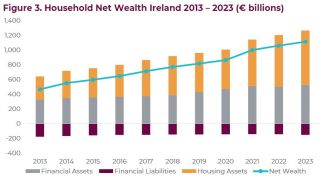Wealth taxes in Ireland

A recent report from the Parliamentary Budget Office provides an overview of taxes on wealth in Ireland. It outlines taxes on wealth, including property and financial assets, and what has been generated from these in recent years. In its final report, the Commission on Taxation and Welfare noted that the share of tax from property and wealth is low and should increase. To date, we have yet to see progress in this regard. And if changes to inheritance taxes proceed in Budget 2025, the level of revenue generated by wealth taxes will fall.
An Overview of taxes on Wealth in Ireland - main findings:
- Household net wealth in Ireland is valued at €1,112 billion in 2023; up from€466 billion in 2013.
- Growth in household net wealth (139%) has outpaced price inflation (18.9%) and wage growth (32.8%).
- Housing wealth is the most significant component of household wealth in Ireland.
- Asset ownership is concentrated among both higher-income households and wealthier households.
- In Ireland, multiple taxes on wealth exist. These are levied on assets and on income and gains derived from these.
- Revenue from taxes on wealth is relatively low, at €4.9 billion in2023.
- Capital Gains Tax is the most valuable tax on wealth in terms of revenue, generating €1.5 billion in 2023.
- Individuals on higher incomes are more likely to be liable for Capital Gains Tax, reflecting the relationship between income and wealth.
- Capital Gains Tax rate in Ireland (33%) is the joint-third highest in the European Union; however, applicable exemptions and reliefs reduce the overall potential yield.
- In 2023, €46 million was foregone through the CGT exemption on the first €1,270 in reported capital gains.
- The top 10% of income earners paid 12% of CAT receipts in 2015; the bottom 10% of income earners paid 5% of CAT receipts. 2015 is the most recent year which data is available for.
- Changes to CAT thresholds happen infrequently and do not appear to follow clear and consistent principles.
- The majority of recommendations from the Commission on Taxation and Welfare relating to taxes on wealth have not been progressed to date.
Household wealth concentrated in top income quintile
Net Irish household wealth, as of Q4 2023, is €1,112.6 billion. This is significantly higher when compared to Q4 2013, when it was valued at €465.9 billion; this represents an increase of 139%, in nominal terms. By contrast, from December 2013 to December 2023 inflation has increased by 19%. This indicates that the value of net wealth (on aggregate) has increased at a greater rate than inflation, thereby not only preserving, but enhancing the purchasing power of households who own assets. From 2013 to 2023, average wages in Ireland have grown by 33%. Although this has been greater than the growth in inflation over the same period, it is significantly smaller than the growth in net wealth. This underlines the role of wealth in preserving and increasing a household’s purchasing power against inflation.

Source: PBO 2024
Types of Wealth
Household net wealth in Ireland is highly concentrated, with the top 20% of households (by income) accounting for 42% of all net wealth. Overall, share of household net wealth is related to household income. Ownership of all financial asset types is more likely where the household has a higher income.
Distribution of Net Wealth by Gross Income Quintile, 2020

Source: Social Justice Ireland, 2024
Housing assets comprise the majority of household net wealth in Ireland, representing 66% of the total as of Q4 2023. This is comparable to Q4 2013 when housing assets represented 68% of net household wealth.

Housing as wealth
The significant concentration of housing assets as a proportion of net wealth in Ireland is likely a factor contributing to rising property prices and housing unaffordability. Figures from the 2022 Census indicate high levels of home ownership in Ireland – with 66% of homes being owner-occupied. A further 18% of households rent from a private landlord.
A central concern with regard to housing is that if housing is seen as an asset and a means to build wealth, this requires continued price growth to sustain wealth growth. This in turn, alongside other factors, makes it increasingly difficult for those who do not own property or any other high-value asset to become homeowners; while also making housing attractive for institutional investors. While this underlines the importance of wealth taxes such as capital gains tax and the local property tax, which can support the stabilisation of property prices and tackle wealth inequality, the State’s approach to taxing wealth cannot be tenure neutral, as any changes will affect either property owners or renters more significantly. Furthermore, the relatively high rates of taxation on wealth and gains derived from financial assets compared to housing assets, create a distortionary effect whereby individuals (and companies) are incentivised to invest in housing to create and grow their wealth.
Overall, the report concludes that household net wealth in Ireland has reached record levels, and has outpaced both price and wage inflation over the last 10 years. While Ireland levies numerous taxes on wealth and income derived from wealth, the overall revenue yield is relatively small. As the value of assets and household wealth held in Ireland grows, it is important that the State adequately and fairly taxes wealth to avoid and correct market distortions, and to broaden the tax base. Addressing the recommendations from the Commission on Taxation and Welfare can assist in increasing the yield in a fair and balanced manner.
Social Justice Ireland view
The CSO’s net wealth measure includes the value of all assets (housing, land, investments, valuables, savings and private pensions) and removes any borrowings (mortgages, loans, credit card debt etc) to give the most informative picture of households’ wealth. Table 3.12 and Chart 3.6 outline some of the key results from the 2020 data including that the median (middle) household net wealth in Ireland in 2020 was €193,100. The CSO data from the household finance and consumption survey indicate that most Irish household wealth is concentrated in property and in particular, housing. Wealth in Ireland is dramatically concentrated in the top quintile (twenty per cent group) of the income distribution. The Gini coefficient for net wealth in 2020 was 65, more than twice the level recorded for income inequality. The composition and distribution of wealth points towards policy issues to be considered, concerning inheritance taxes (capital acquisitions tax), gift taxes and capital gains taxes.
Taxes on wealth are minimal in Ireland. Revenue is negligible from capital acquisitions tax (CAT) because it has a very high threshold in respect of bequests and gifts within families, and the rates of tax on transfers of family farms and firms are very generous. Some recent Budgets have extended the Group A (parent to child) CAT threshold, and the likely future revenue from this area remains limited given the taxes current structure. The requirement, as part of the EU/IMF/ECB bailout agreement, to introduce a recurring property tax led Government in Budget 2012 to introduce an unfairly structured flat €100 per annum household charge and a value-based Local Property Tax in Budget 2013. While we welcome the overdue need to extend the tax base to include a recurring revenue source from property, we believe that a Site Value Tax, also known as a Land Rent Tax, would be a more appropriate and fairer approach.
